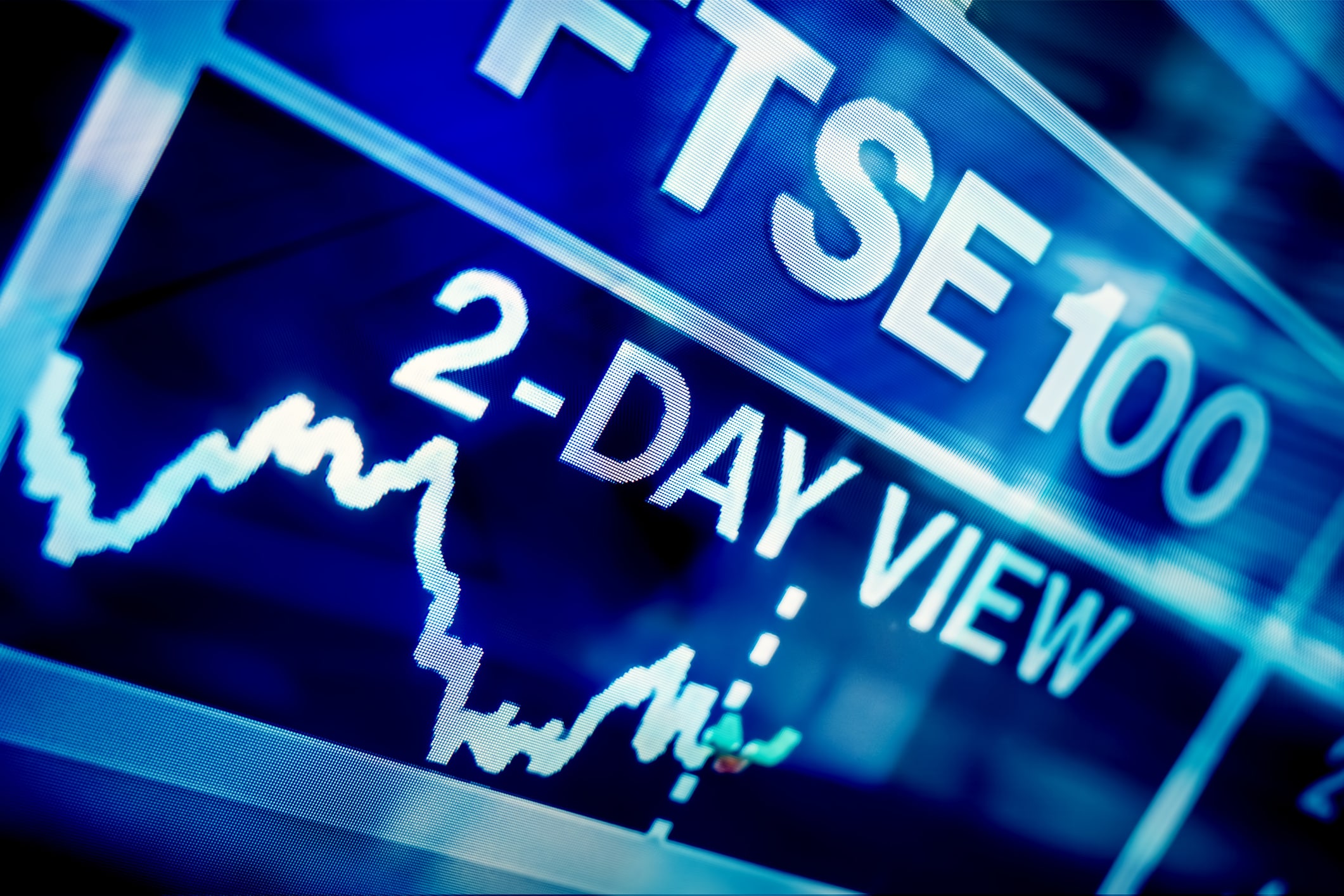
It’s been another testing session for European markets after EU CPI inflation came in above expectations and core prices surged to a new record high of 5.6%.
Europe
Nonetheless while yields have continued to edge higher, markets in Europe have held up quite well, with the FTSE 100 managing to drag itself into positive territory in the afternoon session., although the DAX has lagged.
We’ve also seen a plethora of earnings announcements which have by and large been quite positive, but where the guidance has been slightly underwhelming hence today’s weakness in the FTSE 100.
Irish construction giant CRH is leading the FTSE 100 after reporting a strong performance in its full-year results, posting a 12% increase in revenues to $32.7bn, with a strong showing across all its businesses. Profit after tax for continuing operations was 10% above 2021 levels at $2.68bn, while discontinued operations added $1.19bn, taking total profits to $3.87bn. All three of its business divisions delivered a strong performance with the US business once again delivering a strong performance, delivering a 15% increase in sales. Building products also performed well, increasing sales by 26% and a 52% increase in EBITDA.
The most noteworthy announcement, however, wasn’t about the performance of the business, or the outlook, but the decision to transition to a primary listing in the US, which it said was expected to become an even bigger market for its business in the years to come. This is yet another blow for London and UK markets, and in isolation would probably be easy to dismiss. Coming as it has against a backdrop of recent discussions Shell recently had about relocating to the US, and the decision by Softbank to look at listing its ARM business in the US, it seems to highlight a shift in the business community about the desirability of the London market as a place to do business.
It also feels like a vote of no-confidence in the investment environment here in the UK, as well as a pushback against economically illiterate government policies which discourage investment. They also speak to a lack of confidence in a political class, on all sides of the political divide, that seem more interested in using business as a cash cow, and not as a mechanism to drive innovation and produce the solutions to fix the problems of the next 10-20 years.
Chancellor of the exchequer Jeremy Hunt has the opportunity in just under two weeks’ time to reset this perception in his spring Budget, by not going ahead with the rise in corporation tax to 25%, as well as helping to reassure the business community that they are part of the solution to the problems facing the UK economy, and not part of the problem, which appears to be the perception now.
Melrose Industries is also doing well after a similarly robust trading update, with strong growth in revenues of $8.19bn, and pre-tax profits of £384m led by its aerospace division which posted revenues of £2.95bn, and an improvement in margins from 4.4% to 6.3%.
ITVshares have slipped back despite posting profits that beat expectations. Full year revenues rose 7% to £4.34bn. ITV Studios has continued to come into its own and is getting closer to contributing to 50% of total revenue, rising 19% to £2.1bn. Media and Entertainment, or the advertising part of the business saw a decline of 1% in total advertising revenue (TAR) to £2.25bn. This was at the lower end of expectations.
Advertising has proved to be challenging over the last 12 months, however, the launch of ITVX does appear to have helped mitigate some of the worst effects of that slowdown. Total digital revenues rose by 18% to £411m, while total viewing hours also increased, as did UK subscribers. Adjusted pre-tax profits fell by 13% to £672m, while warning that the outlook for Q1 was likely to remain challenging and that TAR in Q1 was expected to see a decline of 11%.
Haleon shares are also under pressure despite posting a solid set of first full-year numbers as a publicly listed entity. Full-year revenues rose 13.8% to £10.86bn driven by outperformance in its health care brands of pain relief which saw a 14% increase in revenue, and respiratory health, which saw a 39% increase, on the back of strong sales of Theraflu. Net debt has been reduced marginally to £9.87bn, down from £10.7bn post GSK spin off. For 2023 Haleon said it expects organic revenue growth of 4-6%, with operating margins expected to remain unchanged.
LSE shares are also underperforming despite reporting a 19.6% increase in full-year revenue of £7.43bn, driven by a strong performance in data and analytics, which saw revenues rise to £4.94bn, and a 38.8% rise on profit before tax of £1.24bn.
On the outlook LSE has said its Refinitiv integration is continuing apace, while its strategic partnership with Microsoft is expected to deliver new solutions in data modelling and analytics in the cloud. New guidance for 2023 is for constant currency revenue growth of 6-8%, and an adjusted EBITDA margin of circa 48%. This isn’t that much different to where it is now at 47.8%.
Also underperforming are Beazley and Flutter, both on the back of disappointment on their latest results and guidance. Housing stocks are also lower after Taylor Wimpey followed Persimmon earlier this week by warning of lower completions in 2023.
US
US markets opened lower after weekly jobless claims fell back to 190k, and Q4 unit labour costs came in at 3.2%, double estimates of 1.6%. With US 2-year yields closing in on 5% and US 10-year yields now back above 4%, markets are increasingly pricing a higher Fed terminal rate. Since the start of February this rate has risen sharply from 4.9% to be currently sitting at 5.5%. The increasing yield environment is helping to push the Nasdaq 100 and S&P 500 lower, both now flitting around key support levels and their respective 200-day SMAs.
Yesterday’s investor day has seen Tesla shares fall back on a perceived lack of clear detail on the prospect of new electric cars, along with how the company intends to steer towards the market for cheaper models.
Snowflake shares have also slumped despite reporting a 54% increase in Q4 revenue to $555.3m, while projecting that revenues for 2024 would 40% to $2.7bn. It would appear that investors wanted more from the revenue guidance, with Q1 forecast to see revenues of between $568m to $573m.
Salesforce shares on the other hand are helping to support the Dow, surging after the company reported better than expected Q4 results and an upbeat outlook for the upcoming year. Q4 revenues rose 14% to $8.38bn, while profits doubled to $1.68c a share. The Q1 outlook saw revenues estimated at $8.16bn to $8.18bn, and profits of $1.60c a share, while annual 2024 revenues are expected to rise to a minimum of $34.5bn.
Best Buy shares have slipped back despite Q4 revenues coming in ahead of expectations at $14.74bn, along with profits of $2.61c a share. Shareholders appear to have been underwhelmed by the full-year guidance on revenues and profits, which are estimated to be between $43.8bn and $45.2bn and profits between $5.70 to $6.50c a share.
FX
The US dollar has continued to ratchet higher across the board, despite another red-hot core inflation reading, this time from Europe, as EU core CPI surged to a new record high of 5.6% from 5.3% in January.
The euro rather surprisingly has been unable to make any gains on the back of today’s inflation data, despite rising German yields which have remained near their highest level since 2008. Headline CPI inflation fell from 8.6% to 8.5%, however the resilience in core prices is likely to be more of a concern for the ECB which is due to hike by another 50bps in March, and probably a lot more in the coming months. The market is already pricing in another 100bps by the start of the summer, with ECB President Christine Lagarde once again insisting that another 50bps was coming this month.
The pound has continued to sink in the aftermath of Bank of England governor Andrew Bailey’s soft-soaping comments about future rate rises yesterday. Chief economist Huw Pill’s comments this afternoon do still support the idea that rates will need to continue to rise, when he said that inflation risks remained tilted to the upside, with the UK economy slightly stronger than expected.
Commodities
Crude oil prices have continued to gain support from the China data earlier this week but weighing on the upside has been rising concern that accelerating inflation may well curb demand in Europe, after EU core CPI posted a new record high of 5.6%. Chinese demand appears to be being sated by seaborne imports of Russian oil as cheaper prices spur record imports. US crude inventory builds are also helping to keep a lid on prices.
Volatility
A mixed set of earnings from Hewlett Packard saw shares in the tech company reversing recent gains during Wednesday’s trade. The underlying fell by more than 4%, driving one-day volatility to 98.15%, significantly up from the monthly print of 44.7%.
Keeping with single stocks and earnings helped drive action for Just Eat Takeaway, too. Despite posting a small operating profit, the stock fell around 10% in early trade before briefly finding positive territory and then ultimately closing back in the red. One-day volatility was recorded at 215.94% against 81.23% for the month.
Corn prices tested six-month lows during the session, although the worst of the downside proved to be short-lived after bargain hunters moved in to take advantage of what was seen as being an oversold market. One day vol on the soft commodity printed 27.3% against a one-month reading of 17.49%.
Wheat also tested lows not seen since September 2021, with discounting out of Russia and downbeat macroeconomic forecasts seen as weighing here. One-day volatility for the crop sat at 35.91% compared to 31.65% for the month.
The Kiwi Dollar proved to be the most active currency during Wednesday’s trade, with NZD/USD showing daily volatility of 15.74%. That’s well up from the 13.33% monthly reading and was driven by strong gains for the currency off the back of shortfalls in US data prints and what many considered to be an oversold NZD position.
Disclaimer: CMC Markets is an execution-only service provider. The material (whether or not it states any opinions) is for general information purposes only, and does not take into account your personal circumstances or objectives. Nothing in this material is (or should be considered to be) financial, investment or other advice on which reliance should be placed. No opinion given in the material constitutes a recommendation by CMC Markets or the author that any particular investment, security, transaction or investment strategy is suitable for any specific person. The material has not been prepared in accordance with legal requirements designed to promote the independence of investment research. Although we are not specifically prevented from dealing before providing this material, we do not seek to take advantage of the material prior to its dissemination.























